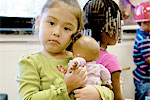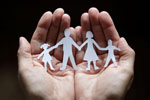Mental Health
Early childhood mental health is a child's (birth to 5 years) growing ability to experience, regulate, and express emotions. They learn to develop close, secure relationships with peers and caring adults. Children begin to explore and learn from their surroundings, pay attention, and follow directions. Early childhood mental health is the same as social-emotional development. Head Start and Early Head Start programs partner with local professionals and other programs to ensure children, families, and staff have access to prevention and intervention services.
Featured Resources
Explore the following resources related to mental health:
Contact Us
If you would like help finding resources, please contact us at health at ecetta dot info.
Select a topic below to see available content:
Promoting Social and Emotional Development

A child's security, happiness, and health begin at birth. Nurturing and caring relationships form the foundation for healthy development. Social-emotional development is enhanced by caring environments and intentional supports by trained adults. Learn more about how to help children and families with this important topic.
Screening and Assessment

Head Start requires that children's social and emotional development is screened and assessed within 45 days of the start of the program year. Identifying children's strengths and challenges is the first step to providing an individualized program to support positive behavior. Health managers and other program staff may use the following resources to better understand social-emotional screening and assessment strategies.
Early Childhood Mental Health Consultation

There is growing concern that increasing numbers of very young children are manifesting behavior problems. Early childhood mental health consultation (ECMHC) is an effective strategy for addressing these challenging behaviors. It also is used to support young children's social-emotional development in early childhood education settings. Use the tools and resources below when designing and implementing effective mental health services for families.
- NEW! Mental Health Consultation Tool
- NEW! Professional Development in Infant/Early Childhood Mental Health Consultation Webinar
- Motivational Interviewing Suite
- Using Motivational Interviewing Techniques to More Effectively Partner with Parents
- Early Childhood Mental Health Consultation – Material for Families
- Early Childhood Mental Health Consultation – An Evaluation Tool Kit
- Facilitating a Referral for Mental Health Services for Children and Their Families Within Early Head Start and Head Start
- Finding a Mental Health Provider for Children and Families in Your Early Head Start/Head Start Program
- What Works: A Study of Effective Mental Health Consultation Programs
Challenging Behaviors and Child Mental Health Concerns

Challenging behaviors may include hitting, biting, scratching, screaming, and taking toys away from others. Challenging behaviors may also include withdrawn behavior such not talking to other children, not engaging with peers or adults, or not knowing how to play with peers. It can be difficult to identify the right strategies to support children who demonstrate these behaviors. When staff and parents learn about effective strategies to respond to challenging behavior, children are more likely to have positive relationships and successful experiences in school. Find out more about child mental health concerns and strategies to effectively respond to challenging behaviors.
Trauma

Children and families across the country experience traumatic events on a daily basis. Head Start and Early Head Start staff has an important role after traumatic events. They can offer support to help reduce stress and encourage children’s’ and families’ resilience. Discover ways to identify and help children and families who have experienced trauma.
Education Activities

New staff and families may have a negative view of the term "mental health." Head Start programs can reduce the stigma of mental health by providing educational activities that help them understand mental health. Use the following resources to support a rich understanding of mental health and social-emotional development.
- Interactive Tool for Parents: Milestones Checklist
- Social and Emotional Development from Birth to Preschool ES
Adult Mental Health

Head Start and Early Head Start programs recognize the importance of nurturing families and staff who work with young children. When programs implement strong systems and policies that support healthy work environments, staff are better able to support families. Explore resources and tools that offer strategies designed to help caregivers deliver services that support the emotional well-being of adults.
- Child Protection in Families Experiencing Domestic Violence
- Depression in Mothers: More Than the Blues - A Toolkit for Family Service Providers
- Family Connections: A Systemic Mental Health Consultation and Professional Development Model
- Health Services Newsletter: Staff Wellness – Managing Stress (August 2014)
- Lean On Me: A Film About Grandparents and Other Relatives Raising Children ES
- Talking about Depression with Families: A Resource for Early Head Start and Head Start Staff
Policies and Procedures

Programs are required to develop, implement, evaluate, and revise policies and procedures that ensure comprehensive mental health services for children, families, and staff. Find resources to assist in understanding and meeting those requirements.
Professional Development
These professional development suites are intended to support ongoing learning and reflection about relevant mental health topics. They can be used by mental health consultants, technical assistance providers, and other facilitators familiar with the topic. Each suite includes a PowerPoint with embedded notes and additional resources to support the topic.
Archived Documents
Promoting Social-Emotional Development
- Acknowledging Positive Behavior
- Guiding Principles: A Comprehensive Approach to the Emotional Health of Infants and Their Families
- Home-Based Early Head Start: Kitchen Therapy
- 'How Head Start Can Help' [in] Stress and the Developing Brain
- 'Steps that Programs Can Take to Promote the Mental Health of New Mothers and Fathers' [in] The Psychological Work of Pregnancy
- Stress and the Developing Brain
- The Importance of Fathers in the Healthy Development of Children
Trauma
- Solutions for Addressing Violence [in] The Effects of Violence on Mental Health
- Witnessing Violence: Behavior Effects on the Child
Adult Mental Health
Last Reviewed: January 2017
Last Updated: January 9, 2017